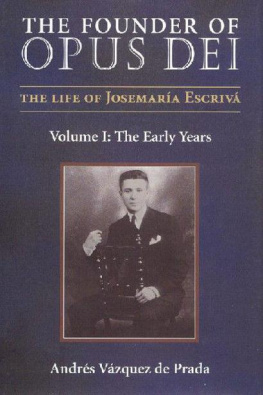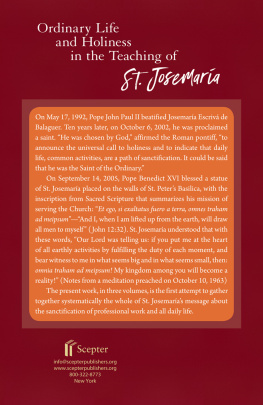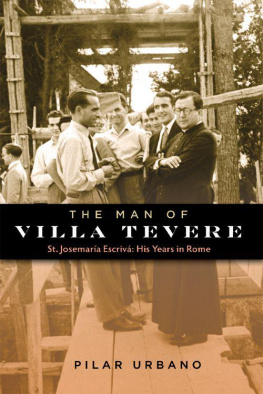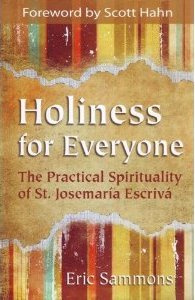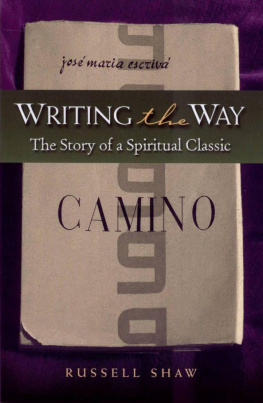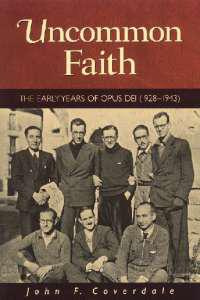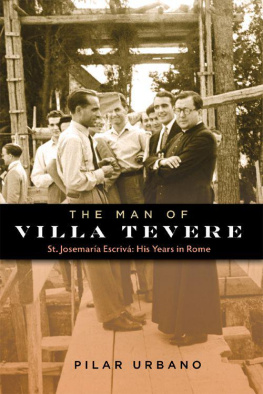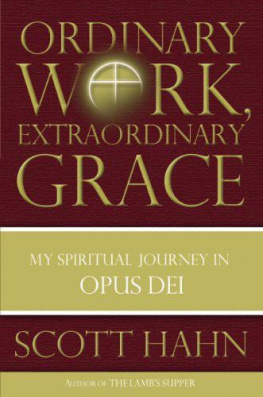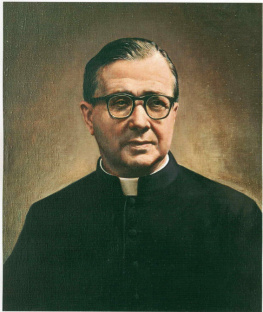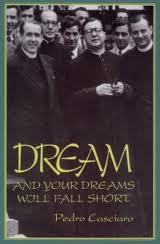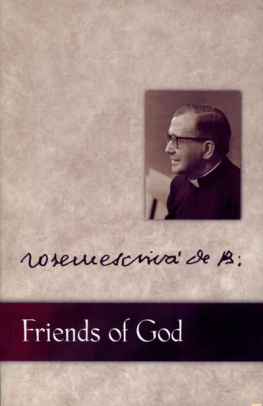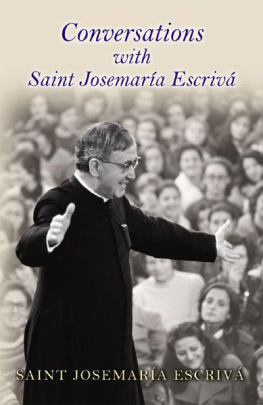
The Founder of Opus Dei
The Life of St. Josemara Escriv
Vol. I
The Early Years
The Founder of Opus Dei
The Life of St. Josemara Escriv
Vol. I
The Early Years
Andrs Vzquez de Prada

Library of Congress Cataloging-in-Publication Data
Vzquez de Prada, Andrs.
[Fundador del Opus Dei. English]
The founder of Opus Dei: the life of St. Josemara Escriv / Andrs Vzquez de
Prada.
p. cm
Includes bibliographical references and index.
Contents; 1. The early years
ISBN 1-889334-25-1 (hb: alk. paper) ISBN 1-889334-26-X (pbk.: alk. paper)
1. Escriv de Balaguer, Josemara, 19021975. 2. Catholic ChurchSpain ClergyBiography. 3. Opus Dei (Society) I. Title.
BX4705.E676 V39 2000
267'.182092dc21
[B]
00-061238
Cover photo: Father Josemara Escriv, taken on Nov. 5, 1946
Courtesy of the Central Archives, Opus Dei Prelature, Rome
Cover design by Carol S. Cates
This edition of The Founder of Opus Dei: The Life of St. Josemara Escriv ,
vol. 1, The Early Years , is published in the United States
by Scepter Publishers, Inc., P.O. Box 211, New York, NY 10018.
www.scepterpublishers.com
ISBN 188933426X
eBook ISBN 978-1-59417-121-5
Spanish original copyright 1997 by Andrs Vzquez de Prada
1997 by Ediciones Rialp, S.A.
Translation 2001 Scepter Publishers
Printed in the United States of America
Contents
AGP | General Archive of the Prelature ( Archivo General de la Prelatura ) |
Apuntes | Personal Notes ( Apuntes ntimos ) |
AVF | Assorted writings of the Founder ( Autgrafos Varios del Fundador ) |
D | Document |
EF | Personal letters of the Founder ( Epistolario del Fundador ), cited by number |
IZL | Section of AGP corresponding to the Servant of God Isidoro Zorzano Ledesma |
Letter | Letters written to all the members of the Work, cited by date and section number |
P01, P02 etc. | Collections of printed documents (sections within AGP) |
PM | Madrid Process of beatification ( Proceso Matritense ), followed by folio number |
PR | Roman Process of beatification ( Proceso Romano ), followed by page number |
RHF | Historical Register of the Founder ( Registro Histrico del Fundador [section within AGP]) |
Sum. | Summarium of the Cause of beatification and canonization. Positio super vita et virtutibus , Rome, 1988. The name of the witness, followed by the corresponding section number of the Summarium . |
T | Testimonial |
What is a biography? In the strict sense of the term it is the story of a particular life. And it falls within the academic field of history. But a life does not exist in isolation, like a small island lost in a vast ocean. It is born and grows to maturity in a community. The individual is tied to a place, participates in a particular culture, and has a homeland. And the events of whatever time and place the subject lives in have an effect on his or her life. Thus the biographical focus necessarily transcends those things that affect only the person in question. The researcher, as well as the reader, has to keep in mind many other cultural and social circumstances to completely understand events and set them in their historical context.
Method of research. The biographer usually adopts a chronological structure, first studying the historical roots, and then proceeding to follow the subjects life from cradle to grave. The author will probably begin by describing the subjects family, home atmosphere, early life, and schooling to show the sources of the subjects personality. But one must avoid fiction and fantasies, and must work according to the methodology of research and the rules for evaluating sources. Thus any biography intended to boast scholarly objectivity represents a serious challenge, since the biographer must first find the testimonies and other relevant documents and then subject them to critical evaluation. (No matter how credible the sources found, the researcher is never dispensed from the arduous task of choosing testimonies, evaluating their significance, and fitting them into the historical picture.)
Abundance of sources. When I felt I had completed the task of collecting testimonies and other historical records and tried to sketch out the structure of this book, I was surprised to see how much material I had collected. To reduce it to manageable proportions, I found I had to concentrate on the founder himself and not get sidetracked into secondary matters. Thus those aspects of Opus Dei that are intimately linked to his personal mission are dealt with fully; other subjects, important in themselves, such as the origins of the spirituality of Opus Dei, the expansion of its message throughout the world, salient features of the cultural and social milieu in which the founder worked, and so forth, are only touched upon. All of that, undoubtedly, will be material for future studies. But here I have confined myself narrowly to biographical matters, to keep the narrative from straying from its subject. Meanwhile, as the notes demonstrate, I have subjected myself to the rigorous rules of documentation and the other critical requirements for historical credibility.
An objective view of historical reality. In this research effort, we can be particularly thankful for one quality of the founder and his writings. I refer to his objective view of events. Father Josemara possessed in a high degree the intellectual gift of being able to evaluate historical realities objectively and clearly. He was always on the alert to see things and situations in the light of Gods designs, setting aside his personal tastes and inclinations and detaching himself from personal interests. In relation to God, the track of his life runs straight, simple, and deep. One might summarize it by saying that he dedicated himself body and soul to fulfilling the plans of God with regard to Opus Dei. On October 2, 1928, after ten years of waiting, and of having premonitions of something that was going to come, he was led by the hand of God into the saga. The young priest received the mission of carrying out Opus Dei, and was granted the corresponding charism. From this date on, God and JosemaraJosemara led by the hand of God, that iswill have together one long and amazing adventure.
The two themes of this biography. Here, then, is one basic theme of this biography: to follow step by step the development of Opus Dei, to the point where the man chosen to carry out this great enterprise puts the final period to his work. Father Josemara devoted his whole life to this effort. This is as much as to say that the charism he received worked, during all those years, within his soul, identifying his person with Opus Dei, making himthe man himselfOpus Dei. That is the other theme of this biography.
Divine logic and human logic. As a father with his child, God taught Josemara a divine logic, at times very disconcerting, that is far different from any human logic. Human logic judges and operates according to earthly criteria. Gods judgments, on the contrary, are lovingly grounded in the sense of divine filiation; in the cross, the joyful sign of Christs victory; in the unlimited power of prayer; in the hidden fruitfulness of setbacks That objective view that the founder had of historical reality was something more than just clear-sighted discernment; it was the gift of being able to penetrate the essence of history, its wise governance by Divine Providence. He applied to religious realities and supernatural events the categories proper to divine logic, in accordance with his divine and universal mission within the Church.
Next page
